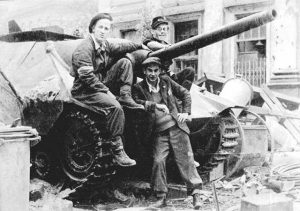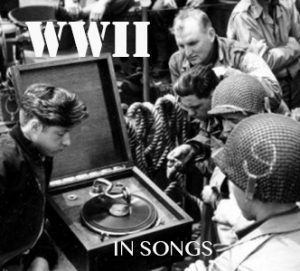
Polish music and uprising during WWII – The World War II in Songs Playlist
This song translates to ”Axe, Hoe” and was a famous Polish military and street-level protest song from the war. It became the most popular song of occupied Warsaw, and then, of the entire occupied Poland.
The song was inspired by an old humorous folk-tune performed already in 1917 with different and constantly changing lyrics, adapted for the army in a 1938 publication under a different title.
Banning the song
The wartime lyrics of the song were created around August 1942 in Warsaw, by a member of ZWZ (Union of Active Struggle, which was an underground army) Anna Jachnina, a young wife of an army captain from before the invasion. It quickly spawned many variants. In 1943 it was published in print by the Polish resistance underground presses. The music – and in part the lyrics – was based on an existing melody and the words of older songs.
The song talks about life in occupied Warsaw. A notable theme of the song, particularly strong in some variants, was the criticism of German practice of łapanka’s – the street round-ups that carted off random passers-by to forced labor duties.
From late 1942 Germany decided to punish singing of that song (and similar ones), but sung poetry, ballads and other patriotic songs would remain popular in occupied Poland throughout the period. ”Siekiera, motyka” would also remain the most popular patriotic, occupation period street song of occupied Poland.
Polish uprising

In 1944 the Polish resistance Home Army tried to liberate Warsaw from Nazi Germany. The uprising was timed to coincide with the Soviet Union’s Red Army approach to the city. But the Soviet advance stopped short, enabling the Germans to regroup and demolish the city while defeating the Polish resistance. The Polish resistance went on fighting for 63 days with little outside support. The uprising was the largest single military effort taken by any European resistance movement during World War II.
One translation of the songs lyrics:

Axe, hoe, moonshine, drinking glass,
day’s łapanka, at night air-raid,
axe, hoe, lights on, AC current,
when will they get out of here.
We have no more place to hide,
dogcatchers don’t let us live.
they are running through the streets,
looking who else can be snatched.
Axe, hoe, hand saw, rope line,
here’s the Prussia, there’s Treblinka
axe, hoe, lights on, AC current,
run, you bastard, away right now.
Axe, hoe, January, February
Hitler and Duce lose their shoes,
axe, hoe, rope line, wire,
Mr. Painter is kaputt.
Axe, hoe, hand saw, vodka
stupid painter lost the war,
axe, hoe, hand saw, knife,
he lost the war just now, now, now.
Here’s the entire World War II playlist:
This song translates to ”Axe, Hoe” and was a famous Polish military and street-level protest song from the war. It became the most popular song of occupied Warsaw, and then, of the entire occupied Poland. The song was inspired by an old humorous folk-tune performed already in 1917 with different and constantly changing lyrics, adapted…
This song translates to ”Axe, Hoe” and was a famous Polish military and street-level protest song from the war. It became the most popular song of occupied Warsaw, and then, of the entire occupied Poland. The song was inspired by an old humorous folk-tune performed already in 1917 with different and constantly changing lyrics, adapted…